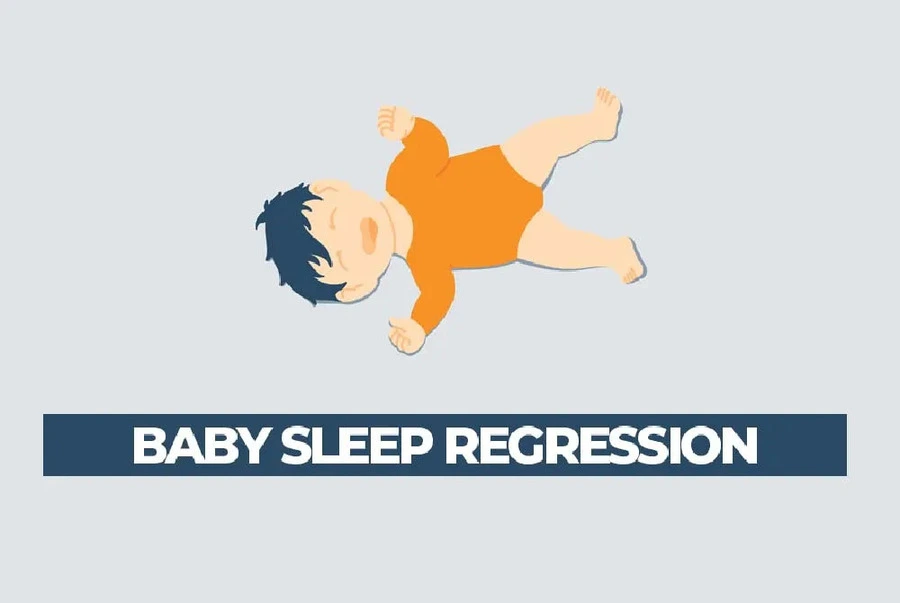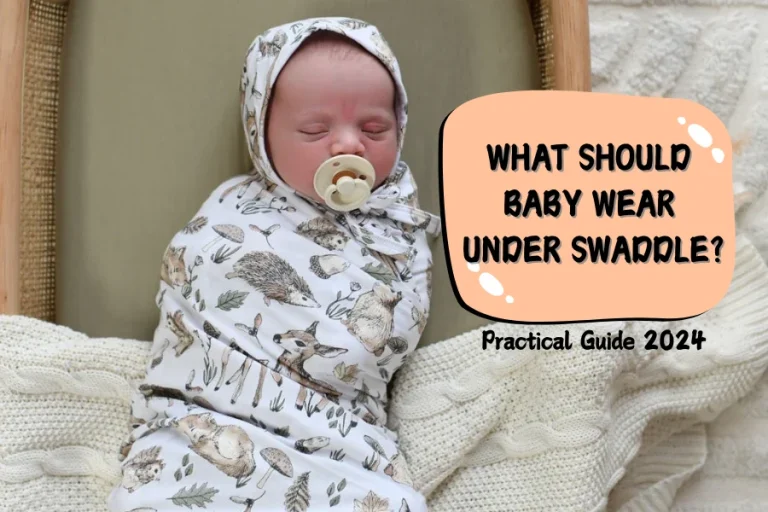
Parents are often helpless when their children don’t want to go to sleep. Whenever it’s time, they will fuss and cry, even try to fight sleepiness or take tiny naps. You will not know what is wrong with them and will feel tired and angry towards the baby.
Here, when the baby often shows symptoms of fussing, crying when going to sleep, fighting with all activities to stay awake, not sleepy, etc., that is called FOMO. In this article, we will tell you about baby FOMO and How to overcome this condition with your baby.
1. Why is FOMO baby fighting sleep?
Children from 6 months to 3 years old have leaps in development. They become more aware of their surroundings, filled with curiosity about everything happening around them. Children develop new skills such as rolling and crawling, fostering a desire to explore. This newfound mobility and curiosity can create challenges at nap time. Imagine a baby happily playing and discovering new things. As bedtime approaches, children may resist sleep by fussing, crying, or trying to stay awake. This is not a challenge; it’s the fear of missing out (FOMO). Fomo baby fighting sleep because they worry that the exciting world and all the fun activities will disappear while they sleep.
On Good Night Sleep Site, an expert once commented that “Parents often mistake an overtired baby for a baby suffering from “FOMO” (fear of missing out)”. In research, this symptom is often found in babies when they first learn to walk and go to kindergarten, and in young children around 4-6 months old because of irregular sleeping habits.
In another development, the baby also does not sleep when he feels tired. Every time their children yawn, they show signs of sleepiness, but as soon as they are put to bed, they become unusually happy and active. This is the scientific effect when adrenaline and cortisol begin to activate in the body, making the baby alert and happy again-explanation from HowStuffWorks experts. In addition, your baby’s sleep will be more difficult in a new environment, being overstimulated when seeing many unfamiliar faces.1

2. Signs your baby has FOMO
- FOMO babies will have difficulty napping, even if you lull and comfort the baby, it will not be easy to fall asleep.
- Babies often stop eating when stimulated by things around them. They are always curious and look around just not to miss anything.
- Although the World Health Organization (WHO) recommends exclusive breastfeeding for the first 6 months, your baby may give signs that they are curious about solid foods. They often take your food to show their passion for it when they see something new
- Children with FOMO often show no signs of fatigue until they become overtired and irritable that it becomes difficult to put them to bed.
- FOMO children can be very observant, always watching what you are doing and where you are going. They may become fussy if you put them down or turn your attention elsewhere.
- New places and people excite children with FOMO, leading to disrupted sleep with all the new things to observe. Even after a long struggle to get them to sleep, babies might have light sleep that’s easily disrupted.
3. Causes FOMO baby fighting sleep
Your newborn sleeps through the night, and does not show signs of crying or waking up in the middle of the night, but often shows signs of resistance when it’s time to go to bed, making you tired and always having to find a reason.
They are so excited while playing
Toddlers may be more easily stimulated by high-energy playtime, stimulating screen time, or sugary snacks close to bedtime. All this excitement can make them feel stressed and make it difficult for them to relax and fall asleep.

Feeling uncomfortable
In addition to the excitement of the day, physical discomfort can be the main cause of children’s difficulty sleeping. A full diaper, itchy pajamas, or a too hot or too cold room can all disrupt your baby’s sleep. So, parents can choose comfy clothes for babies to help them fall asleep.
Feeling curious about everything
At about 6 months old, your baby enters a period of rapid development. They are increasingly aware of their surroundings and curious about everything happening around them. This newfound curiosity can lead to resistance before bed. Imagine a baby happily playing in the living room. When it’s time for bed, children may not want to go back to their room for fear of missing out on fun activities happening elsewhere.

Being scared
Fear of missing out plays a big role in children’s difficulty sleeping. Children are developing a sense of themselves and the world around them, and bedtime can make them feel like they’re missing out on all the fun. This can be further complicated by toddlers’ natural fear of the unknown. Darkness, hidden monsters under the bed, and strange noises all become nightmares for children.
4. How to help your FOMO baby sleep well?
Flexible Nap Scheduling
Flexible nap scheduling focuses on the baby’s awake windows rather than rigid nap times. Babies have varying needs, they can show signs of sleepiness at different times each day. By observing the baby’s sleep cues-such as rubbing eyes, yawning, and increased fussiness-parents can determine the optimal times for naps. To avoid rigid sleep training, this method offers a natural and self-directed sleep plan. Your baby can go to bed at any time during the night. They can switch to earlier or later times if needed. The goal is to help your baby follow a natural rhythm instead of a strict rhythm.
Optimized Sleep Environment
To help infants overcome factors that hinder sleeping, it is vital to create a sleep environment that reduces stimulation. This can be done by using blackout curtains which close out light and relay to the baby that it is now time for sleeping. Buying another white noise machine is also beneficial as it can mask the noises coming from the house as well as outside noises. This serves to create a consistent and agreeable background. Sleeping should also not be able to be interrupted by noises such as music, television shows, and films. This may include toys or bright colors in the living area. But, it should be aimed at comfort and relaxation. This way, the baby can easily fall asleep.

Consistent Routine
Research shows that maintaining a regular bedtime routine is important for your baby2. It can let the baby know when it is time to transition from playful mode to sleeping mode. This process may involve a set of calming procedures like having a bath, rocking, or listening to a short story or a lullaby. Doing these activities every night helps the baby ask. It soothes them and lets them go to bed easily. Isolation increases consistency. It also signals other bodily functions that mark day and night.
Prioritizing Early Naps
This is more relevant to the morning nap because, unlike the afternoon nap, it is common to wake up feeling more refreshed than before. It helps to prepare the baby for the other sleep stages for the day by establishing the right time while still being night time. If they do, they will find it hard to go to sleep or stay asleep in the afternoon. The first nap is healthy, it can help set a regular sleep-wake schedule and lead to a peaceful night’s sleep. Parents should try to ensure that this nap is of adequate length and takes place in appropriate sleeping conditions.
Adapting During Disruptions
When your baby’s schedule is disrupted by travel, illness, or other events, it can lead to temporary insomnia. You can put your baby to sleep with favorite sleep items, like blankets or stuffed animals, which will provide a sense of familiarity and reduce sleep regression. It may also involve sticking to key parts of the bedtime routine and being patient and flexible. Consistency in the environment and sleep routine helps your baby feel secure.

Importance of Consistency
Consistent sleep schedules, routines, and the sleep environment are key, this is fundamental for good sleep habits. Regularity helps the baby understand what to expect and provides a sense of security. Putting your baby down and waking him up simultaneously every day. A soothing bedtime routine helps your baby learn when to sleep and when to wake up. This predictability is comforting and aids in the development of a healthy sleep pattern.
Learning a Skill
Sleep is a skill that babies need to learn, and parents play a crucial role in helping them develop this skill. This involves teaching the baby how to fall asleep independently and stay asleep. Some good techniques include putting the baby to bed awake. The goal is to make them find their ways to calm down. It is most important to inform parents that for days or weeks, the level of intervention, which includes rocking or patting, can gradually fade. The skill-boosting process enables the baby to sleep alone, it helps them to practice better sleep. This benefits all involved family members.

5. Conclusion
FOMO (fear of missing out) is a real struggle for both parents and little ones during sleep time. By understanding why FOMO disrupts sleep, parents can use strategies such as flexible naps, good sleep environments, and consistent routines. These steps create a calming and predictable sleep for babies. We hope you can take time to read our helpful article, it will reduce your baby’s FOMO and help everyone rest better.
Sources
- Marie S. Overstimulated baby: 11 signs, coping, prevention, and tips. Healthline. 2024. ↩︎
- Allen SL, Howlett MD, Coulombe JA, Corkum PV. ABCs of SLEEPING: a review of the evidence behind pediatric sleep practice recommendations. Sleep Med Rev. 2016;29:1–14. doi: 10.1016/j.smrv.2015.08.006. ↩︎






